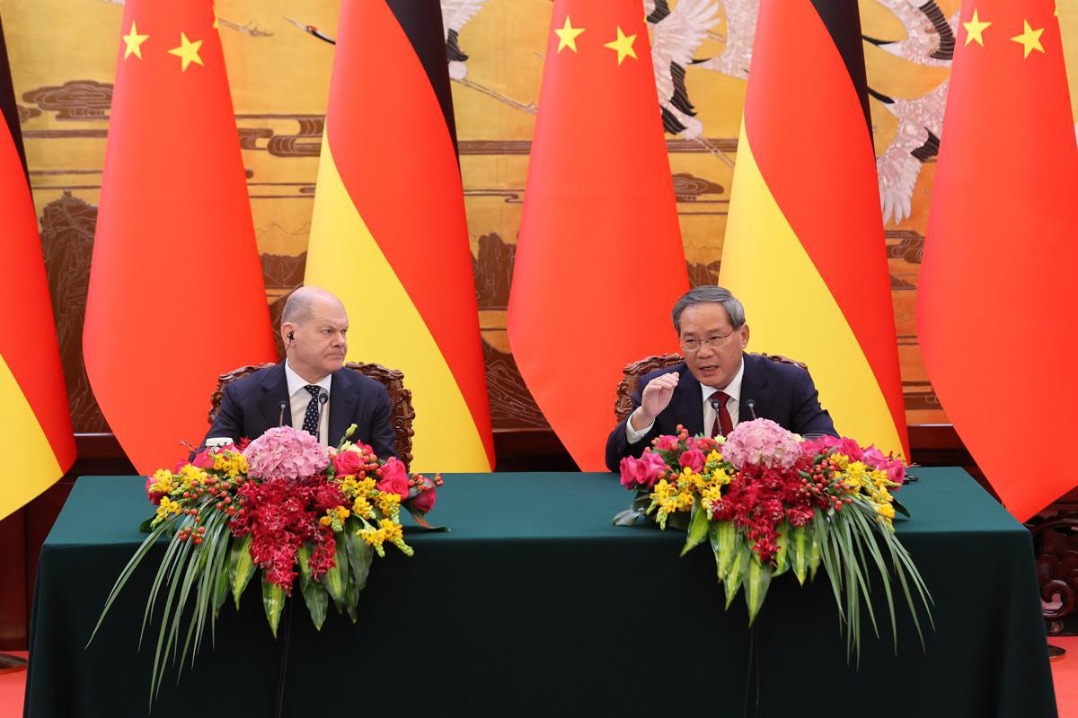


The advantages of China”s new energy industry are shaped through sound market competition rather than relying on government subsidies, Premier Li Qiang said on Tuesday, reiterating China’s willingness to work with all parties to uphold fair competition and open cooperation for win-win results.
Li made the remarks when jointly meeting the media with German Chancellor Olaf Scholz in Beijing, after they held a bilateral meeting and attended a symposium of the China-Germany Economic Advisory Committee on the last day of Scholz’s visit to China.
Li responded at the joint news conference to the recent hyping up of China’s “overcapacity”, saying that countries tend to have higher production capacity in their competitive industries but lower capacity in other sectors, and this is determined by their individual comparative advantages.
“The strong market competitiveness of China’s new energy products was a result of multiple factors, including their accumulated technological superiority established through long-term research and development investment, as well as a complete industrial support capacity, an ultra-large market and rich human resources in the country,” Li said.
According to the premier, the two sides have agreed to pursue further efforts to make the China-Germany dialogue more effective, trade more vibrant, cooperation closer and friendship more solid.
Li noted that strengthening strategic communication and deepening mutually beneficial cooperation between the world’s second- and third-largest economies is not only crucial for the development of the two countries, but is also important for the peace, stability and prosperity of the Eurasian region and the whole world.
As China is ready to import more quality products from Germany and has lifted restrictions on German goods such as beef and apples, “we also hope the German side will reduce its restrictions on the exports of high-technology equipment and high value-added products to China”, he said, adding that this will help facilitate the trade balance between the two countries.
Li said that China and Germany will further tap the potential of service trade cooperation. “We expect German enterprises in such sectors as education, finance, tourism and culture to provide more high-quality services for Chinese consumers.”
Germany is among the six countries that enjoy a unilateral visa-free policy extended by China since late last year to facilitate cross-border travel. According to Li, the policy has so far enabled 90,000 visits by Germans to China.
He also called for the two sides to work together to provide more convenience for personnel exchanges and support communications between the two countries’ arts, sports and education sectors, thus consolidating the foundation of public opinion.
Scholz reiterated that Germany does not seek to decouple from China, its most important trading partner, but rather hopes to deepen their economic ties, which benefit both sides.
Germany is ready to work with China to strengthen dialogue and communication, deepen practical cooperation, advance people-to-people exchanges and jointly address climate change and other global challenges, in order to push for greater development of the China-Germany comprehensive strategic partnership, he said.
He also expressed Germany’s opposition to trade protectionism and said his country is willing to work with China to create a level playing field.
The two leaders witnessed the signing of multiple cooperation documents after their meeting.
Roland Busch, CEO of Siemens and a member of the high-level delegation that accompanied Scholz to China, said he would give the trip a very high score because “we are bringing our collaboration to the next level”.
“I hope this dialogue will give us more tail wind in the market,” he said.